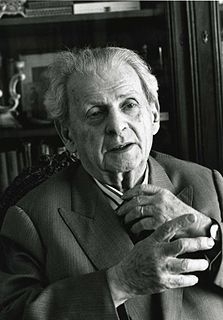A Quote by Martin Heidegger
Transcendence constitutes selfhood.
Quote Topics
Related Quotes
I think the media in America have been absolutely fantastic about the rise of Trump, they've kept a firm eye on the ball: this constitutes democracy, this constitutes transparency, this constitutes fairness, this constitutes the way to behave in a civic society, this constitutes fascism, this constitutes authoritarianism. They're drawing that line, and they're calling him out every time. That's really what needs to happen, and you just have to do that.
Surely if living creatures saw the results of all their evil deeds, they would turn away from them in disgust. But selfhood blinds them, and they cling to their obnoxious desires. They crave pleasure for themselves and they cause pain to others; when death destroys their individuality, they find no peace; their thirst for existence abides and their selfhood reappears in new births. Thus they continue to move in the coil and can find no escape from the hell of their own making.
Love remains a relation with the Other that turns into need, transcendent exteriority of the other, of the beloved. But love goes beyond the beloved... The possibility of the Other appearing as an object of a need while retaining his alterity, or again,the possibility of enjoying the Other... this simultaneity of need and desire, or concupiscence and transcendence,... constitutes the originality of the erotic which, in this sense, is the equivocal par excellence.
There is little mysticism without an element of transcendence, and conversely, there is no transcendence without a certain degree of egocentrism. It may be that the genesis of these experiences is to be sought in the unique situation of the very young child in relation to adults. The theory of the filial origin of the religious sense seems to us singularly convincing in this connection.
When we find that God's ways always coincide with our own ways, it's time to question who we're really worshipping, God or ourselves. The latter moves the nature of godliness from the King to our servant to a slave, a deduction into the realm of selfhood and then the lower, slavehood. It's a spiritual mathematics in that men who need God in his godhood are humble yet strong and spiritually ambitious while men who need a slave in their selfhood are ultimately paralyzed and will remain paralyzed.
Church is missing transcendence. My generation was raised on a religion of moral control. Do this. Don't do that. And a lot of self-help religion. Feel better. Get out of debt. Six ways to overcome your fears. Seven ways not to lust. Ultimately that message didn't work. It was empty. There was no transcendence. The omniscient, omnipresent, all-powerful God of the universe wasn't the focus.
Certainly what constitutes a stage actor, what constitutes a film actor, I don't even know what that is. And both things are very accurate, in a sense. In terms of people's needs to concentrate on race, I wonder if it's completely necessary, but it's not something that is so dynamically relevant to me that I feel it should be one thing or another.








































